MIT Lesson 29A Kanji: 第29A課の漢字
 Warning!
There is Japanese text on this page. If it looks like this: $BI4@i
instead of this: "
Warning!
There is Japanese text on this page. If it looks like this: $BI4@i
instead of this: " ", then read this.
", then read this.
 Athena users - for instructions on how to
print this page, read
this.
Athena users - for instructions on how to
print this page, read
this.
In the following definitions, on (Chinese-based) readings
are represented by katakana, and by capital romaji letters; kun
(native Japanese-based) readings are represented by hiragana, and by
lower-case romaji letters. This is a common dictionary convention, and
does not have any bearing on meaning.
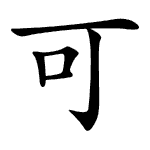
Printed form:
可
Readings:
カ
Meaning:
to be able, to be possible,
to permit
- Usage Examples:
- 可能
不可能なこと
許可(きょか)する to permit
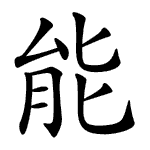
- Printed form:
- 能
-
- Readings:
- ノウ
- Meaning:
- ability, to be possible
-
- Usage Examples:
- 可能性
能力
才能(さいのう)talent
能率(のうりつ)efficiency
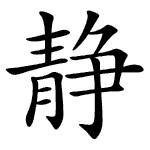
- Printed form:
- 静
- Readings:
- ジョウ
- セイ
しず(か)
- Meaning:
- quiet, calm
- Usage Examples:
- 静かな町
静止(せいし)する to stand still
静寂(せいじゃく) quietness
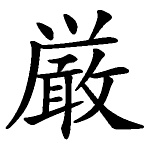
Printed form:
厳
- Readings:
- ゲン
きび(しい)
おご(そか)
- Meaning:
- strict, stern, intense
- Usage Examples:
- 厳しい練習
厳重(げんじゅう)な セキュリティ strict security
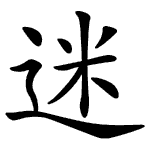
- Printed form:
- 迷
- Readings:
- メイ
まよ(う)
- Meaning:
- to be perplexed, to get lost
- Usage Examples:
- 道に迷う
迷子(まいご)lost child
迷信(めいしん)superstition
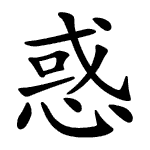
- Printed form:
- 惑
- Readings:
- ワク
まど(う)
- Meaning:
- bewildered, misled
- Usage Examples:
- 迷惑する
ご迷惑をおかけしました
戸惑い(とまどい) bewilderment
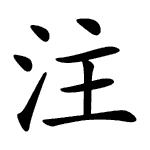
- Printed form:
- 注
- Readings:
- チュウ
そそ(ぐ)
- Meaning:
- to pour, to concentrate
- Usage Examples:
- 注意する
注文する
水を注いだ
注目(ちゅうもく)する to pay attention
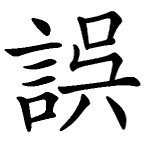
- Printed form:
- 誤
- Readings:
- ゴ
あやま(る)
- Meaning:
- mistake, error
- Usage Examples:
- 誤解する
誤解を招く
誤った考え方
誤差(ごさ)abberation, error
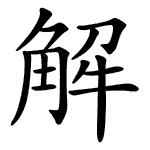
- Printed form:
- 解
- Readings:
- カイ
と(く)
- Meaning:
- to take apart, to dissolve
- Usage Examples:
- 問題が解決(かいけつ)する to solve a problem
解答(かいとう)answer
理解(りかい)understand
正解(せいかい)correct answer
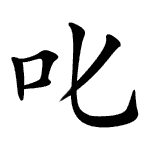
- Printed form:
- 叱
- Readings:
- しか(る)
- Meaning:
- to scold
- Usage Examples:
- 叱られた
叱責(しっせき)する to rebuke
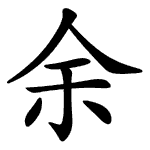
- Printed form:
- 余
- Readings:
- ヨ
あま(る)
- Meaning:
- remaining, excess
- Usage Examples:
- 余分(よぶん)excess
食べ物が余った
余地(よち)room, margin
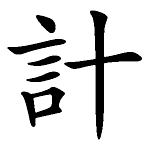
- Printed form:
- 計
- Readings:
- ケイ
くわだてる
- Meaning:
- to plan, to compute
- Usage Examples:
- 余計なこと
計算(けいさん)する
時計
合計(ごうけい)total
会計(かいけい)accountant
統計(とうけい)statistics
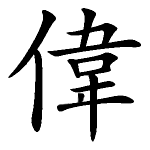
- Printed form:
- 偉
- Readings:
- イ
えら(い)
- Meaning:
- great
- Usage Examples:
- 偉そうにみえる
偉業(いぎょう) great work
偉大(いだい)な人 great man
- >
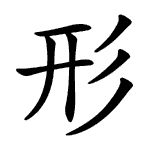
- Printed form:
- 形
- Readings:
- ケイ
- ギョウ
- かた
- かたち
- Meaning:
- shape
- Usage Examples:
- 人形(にんぎょう)
形がわからない
形式(けいしき)formality
図形(ずけい)diagram
長方形(ちょうほうけい) rectangle
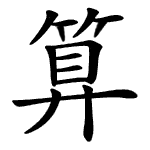
- Printed form:
- 算
- Readings:
- サン
- Meaning:
- to calculate
- Usage Examples:
- 算数(さんすう)arithmetic
計算機
足し算(たしざん)addition
引き算(ひきざん)
subtraction
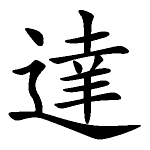
- Printed form:
- 達
- Readings:
- タツ
- たち
- Meaning:
- to attain, to achieve
(suffix)
- Usage Examples:
- 友達になる
発達(はったつ)する to develop
上達(じょうたつ)する to make progress
達人(たつじん) expert
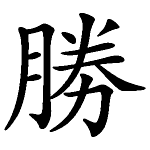
- Printed form:
- 勝
- Readings:
- ショウ
か(つ)
- Meaning:
- to win
- Usage Examples:
- 試合に勝つ
勝負(しょうぶ)
勝ち負け
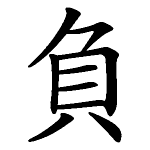
- Printed form:
- 負
- Readings:
- フ
- ブ
ま(ける)
お(う)
- Meaning:
- to lose
- Usage Examples:
- 5対2で負けた。
負の数 negative number
責任を負(お)う to take responsibility
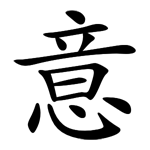
- Printed form:
- 意
- Readings:
- イ
- Meaning:
- meaning; reason; mind; feeling; thought; idea; intention; opinion
- Usage Examples
- 意味
- 意見(いけん)を言う say one's opinion
- 意地悪な人(いじわる)ill-natured person
[Japanese
6 Kanji] [Japanese
6]
![]() Warning!
There is Japanese text on this page. If it looks like this: $BI4@i
instead of this: "
Warning!
There is Japanese text on this page. If it looks like this: $BI4@i
instead of this: "![]() ", then read this.
", then read this.![]() Athena users - for instructions on how to
print this page, read
this.
Athena users - for instructions on how to
print this page, read
this.

















